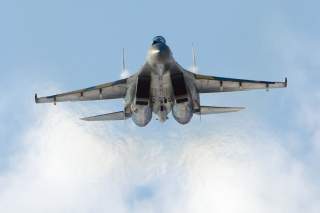Get Ready, America: Russia Is Back in a Big Way in the Middle East
Putin has just proved that a military intervention in the Middle East does not have to lead to a quagmire.
After years on the sidelines, Russia is back at the center of the Middle East geostrategic game. Against the background of an equivocal United States policy, Russia’s calculated intervention in the Syrian civil war is a rare case in which a limited use of power in the region resulted in a major diplomatic shakeup.
In a recent interview with Jeffrey Goldberg, US President Barack Obama revealed his thinking in a number of key foreign-policy areas, particularly the Middle East. Cynically dismissive of both his European allies and his security advisers, including former Secretary of State Hillary Clinton, who supported military intervention in Syria, Obama minces no words in his fatalistic depiction of the troubled region.
According to Obama, there is little, if anything, America can do to stabilize the Middle East. He even claimed to be proud of not enforcing the ‘red line’ he had drawn in 2012 regarding Syrian President Bashar al-Assad’s use of chemical weapons, as neither international law nor the US Congress would have sanctioned intervention. That decision, Obama emphasized, enabled an agreement to remove, with Russian cooperation, most of Syria’s chemical-weapons stockpile.
But, as Goldberg points out, the decision not to enforce the red line with air strikes may also have caused the Middle East to "slip from America’s grasp." And, indeed, important strategic assets in the Middle East have been lost to unfriendly powers, from Russia to the Islamic State (ISIS). Add to that the alienation of close allies, many of which doubt the ability and willingness of an Asia-fixated US to stand by them, and Obama’s suggestion that the US should not be focused on the Middle East is shocking.
Of course, a key motive for Obama’s reticence to engage in the Middle East is fear of repeating the mistakes that left the US enmeshed in Afghanistan and Iraq – the result of what Obama called the US government’s unthinking "drift toward war in Muslim countries." But Putin has just proved that a military intervention in the Middle East does not have to lead to a quagmire. In fact, far from fulfilling Obama’s pessimistic predictions, Russia’s Syrian operation may help drive forward a political settlement.
By refusing to be drawn into a long and costly war that would allow Assad to recover most of Syria’s territory, Putin has effectively created a deadlock, which forces both the regime and the opposition to engage seriously in the Geneva peace talks. In this sense, says Monzer Makhous, a spokesman for the Syrian opposition, Russia’s decision to pull out "changes the entire situation."
What would a political settlement look like? One option, which Russia has championed, would be a federal system; indeed, the territorial divisions left behind by the Russians could form the basis of one. Assad’s Alawites could control territory in the West, running from Latakia in the north to Damascus in the south, and an autonomous Syrian-Kurdish region could be established in the northeast, with the rest of the country being left to the Sunni opposition.
Peace is not yet around the corner, though. Iran and Saudi Arabia, with their proxies on the ground, remain at loggerheads over how to resolve the conflict; Turkey is engaged in its own war against the Kurds; and the Sunni opposition remains unwilling to compromise. Should Assad be tempted to recover Aleppo, the Sunni rebels would certainly break the ceasefire and blow up the entire political process.
Even without a political settlement, Putin’s strategic achievements are notable. Russia’s military operation saved its imperiled ally, Assad, from defeat and secured its airbase in Latakia and its naval presence there and in Tartus. These strongholds will allow him to challenge US and NATO control in the eastern Mediterranean.
The bottom line is that Russia has consolidated its position as a power to be reckoned with in the Middle East. With the US having largely followed Russia’s lead in the Syrian conflict since the crisis over Assad’s chemical weapons, Middle Eastern leaders now head to Moscow, not Washington, to advance their interests. King Salman of Saudi Arabia will visit the Kremlin this month to discuss economic cooperation worth billions of dollars. As for Saudi Arabia’s nemesis Iran, Ayatollah Ali Khamenei’s senior counselor, Ali Akbar Velayati, was in Moscow in February.
Israel, for its part, risked a diplomatic crisis with Australia last month by abruptly canceling an official visit by President Reuven Rivlin, who instead headed to Moscow for an urgent meeting with Putin. (And this occurred just after Prime Minister Binyamin Netanyahu canceled a planned meeting with Obama in Washington, without even bothering to communicate that officially to the White House.)
For Israel, Russia’s military offensive was a boon, as it will prevent the Iran-Hezbollah-Assad axis from dictating the Syrian conflict’s outcome. Having coordinated fully with the Russians on the Syrian front, the Israelis now expect Putin to work to keep Iranian forces away from their border on the Golan Heights, and to help bring United Nations observers back to the area.
To be sure, Putin is nowhere near securing a return to the Soviet Union’s imperial days in the Middle East – not least because Russia’s capacity to sustain a military operation beyond its borders remains severely limited. But his smart use of hard power to achieve specific, achievable objectives in Syria has made Russia a focal point for the major actors in the Middle East – creating a serious geopolitical challenge for the US. The next American president, it is clear, will have to rethink US regional strategy.
This piece first appeared in ASPI's The Strategist here.
Image: Creative Commons.

